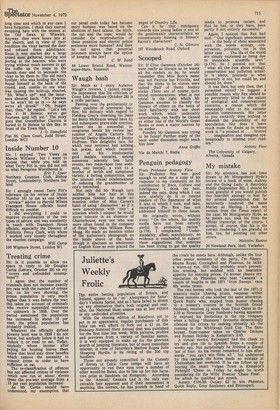Treating crime
Sir: Is it possible to allow me space to reply to Mr Douglas Curtis (Letters, October 28) on my "errors and unfounded assumptions"?
I agree that the number of criminals does not increase exactly Pro rata with the number of crimes but, on his own showing, the Prison population is very much higher than it was before the war; this takes no account of criminals who receive suspended sentences — unknown in 1938. Over the Period mentioned the population has increased by about 15 per cent; the prison population has Probably trebled.
Whatever the officially defined Poverty level was in 1938 I do not know, but anybody below it had to endure it or steal to eat. Today, anybody whose income after Paying for housing leaves them below that level may draw benefits Which remove the necessity to commit crime in order to have sufficient to eat.
The re-classification of offences has not affected crimes of violence Which now run at about eleven tunes the pre-war average from a 15 per cent population increase!
As Mr Curtis should have Understood, my assumption that our penal code today has become more humane was based on the abolition of hard labour, the birch, the cat and the rope; would he consider the reintroduction of these penalties and shorter prison sentences more humane? And does he not agree that potential prisoners always have the option of keeping the law?
C. W. Bond 88 Lower Bristol Road, Westonsuper-Mare, Somerset








































 Previous page
Previous page